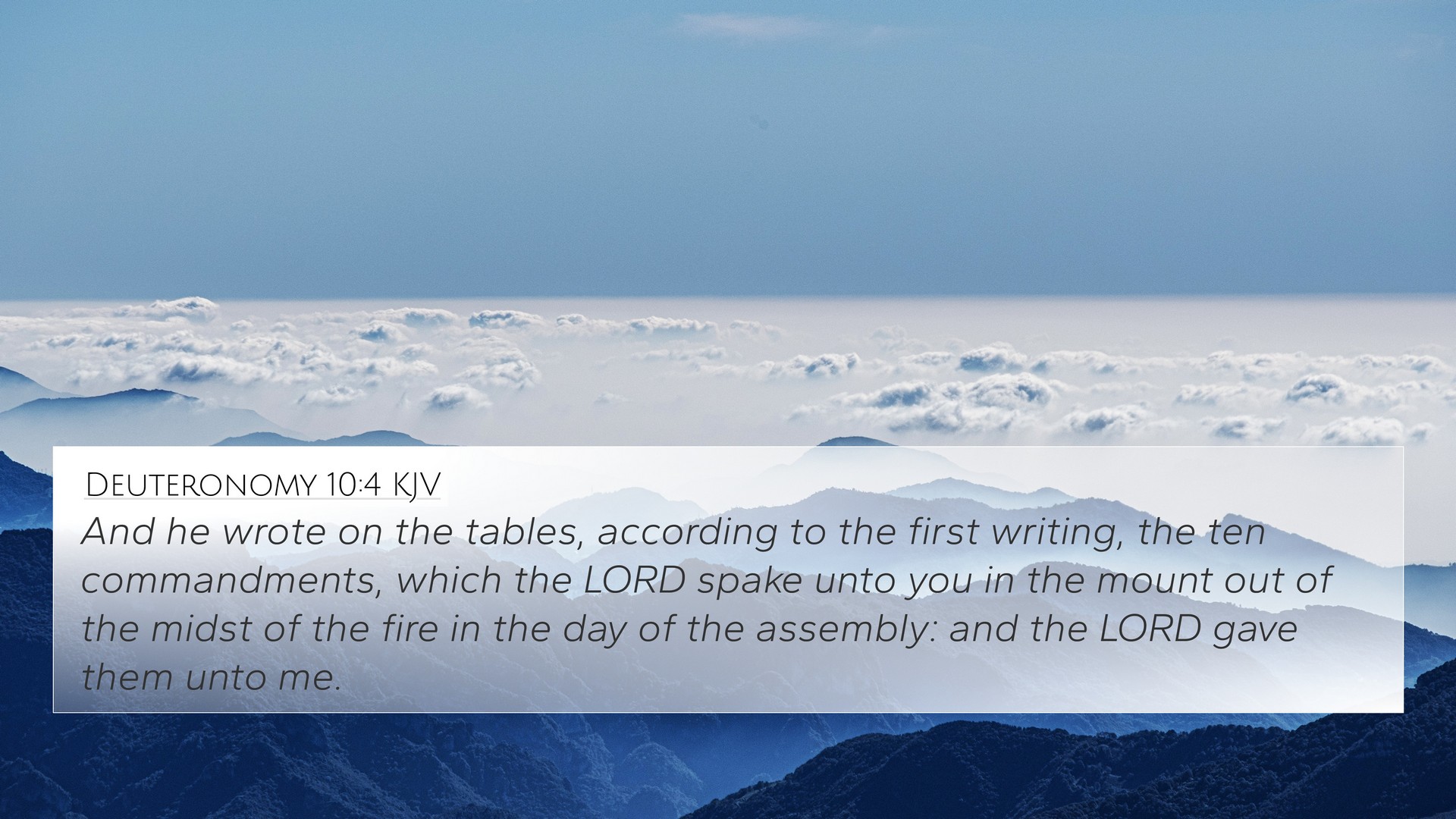Understanding Deuteronomy 10:4
Deuteronomy 10:4 states, "And he wrote on the tablets, according to the first writing, the Ten Commandments, which the Lord had spoken to you on the mountain out of the midst of the fire in the day of the assembly; and the Lord gave them to me." This passage recounts a moment of divine instruction and covenant renewal, underscoring the significance of God's commandments in the life of His people.
Summary of Insights from Public Domain Commentaries
-
Matthew Henry's Commentary:
Henry emphasizes the importance of the Ten Commandments as foundational to the Mosaic Law. The act of rewriting the commandments signifies God's enduring covenant with Israel and the necessity of these moral laws for maintaining a relationship with Him. The historical context—God speaking from the fire—is also highlighted to show God's authority and the seriousness of the commandment.
-
Albert Barnes' Notes:
Barnes details the specific reference to the "first writing," indicating a restoration of what had been lost. He points out that the commandments were not merely rules but a reflection of God's holiness. The giving of the commandments again serves as a reminder of God's mercy and desire for a faithful relationship with His people.
-
Adam Clarke's Commentary:
Clarke elaborates on the significance of God's presence during the delivery of the commandments. He notes that the act of God's writing emphasizes the authority and permanence of the laws. Clarke also comments on the communal aspect of the commandments, stating that they were given to guide the entire nation of Israel in their covenant relationship with God.
Cross-Referencing Biblical Texts
This verse connects with numerous other scriptures that reinforce its themes. Below are some biblical cross-references:
- Exodus 20:1-17 - The original giving of the Ten Commandments.
- Exodus 34:1-4 - The Lord instructs Moses to chisel out two new tablets.
- 1 Kings 8:9 - The tablets are kept in the Ark of the Covenant, symbolizing God's ongoing covenant with Israel.
- Psalm 119:11 - Emphasizes the importance of hiding God's word in one's heart, reflective of the commandments.
- Matthew 5:17-19 - Jesus speaks of the importance of the Law and its enduring relevance.
- Romans 7:12 - Paul affirms that the law is holy, just, and good.
- Hebrews 8:10 - God promises to write His laws on the hearts of His people.
- James 1:25 - The law provides freedom, revealing the blessings in obeying God's commands.
- John 14:15 - Jesus connects love for Him with obedience to His commandments.
- 2 Timothy 3:16-17 - Highlights the inspiration of Scripture, underscoring its purpose in teaching and correction.
Thematic Connections
The themes of divine authority, moral law, and covenant relationship emerge prominently in this verse. Examining cross-references provides deeper insights into the interconnectedness of biblical teachings:
- Moral Law: The Ten Commandments serve as the ethical foundation for God's people, mirrored in both Old and New Testament teachings.
- Divine Instruction: The reiteration of the commandments underscores the importance of God's guidance in leading a righteous life.
- Covenantal Love: The relational aspect of following God's commandments illustrates a theme of love and commitment throughout Scripture.
Conclusion
In Deuteronomy 10:4, the repetition of the giving of the Ten Commandments highlights the enduring nature of God's law and its centrality in the covenant relationship between God and Israel. Understanding this verse within the broader biblical narrative helps to illuminate how the principles contained within the commandments resonate throughout Scripture, calling believers to a life of obedience and faithfulness.
Tools for Bible Cross-Referencing
For those keen on exploring the interconnectedness of Scripture further, several tools for Bible cross-referencing can be utilized:
- Bible Concordance: A valuable resource for locating verses associated with specific keywords.
- Cross-Reference Bible Study: Engaging with related verses enhances understanding and application of biblical truths.
- How to Use Bible Cross-References: Familiarize yourself with various methods for identifying connections between scripture passages.
- Bible Reference Resources: Many studies and commentaries provide additional insight into scriptural cross-referencing.
- Comprehensive Bible Cross-Reference Materials: Various study Bibles include cross-references alongside texts for easier navigation.










